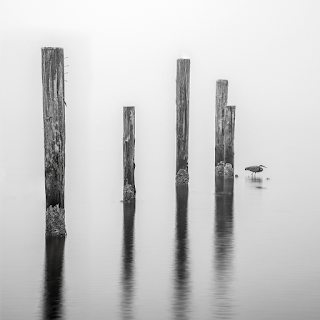- Oliver Sacks (1933 - 2015)
Postscript #1. The triptych consists of images I captured one day last summer after my wife parked her car in a garage near a local farmer's market. I was mesmerized by the "organized cacophony" of shimmering reflections off other car's hoods and hubcaps that arranged - and revealed - themselves to anyone interested in looking. Though I lamented not having my "real" camera, I was happy to have my iPhone to capture this lovely visual feast! Yet another gentle reminder that we must always be on alert to the universe's ceaseless wonders. And, though I rarely talk about the "nuts-and-bolts of photography on my blog (and much prefer posting images and musings than highlighting what f-stop I used), here's a small - hopefully useful - foray into the "nuts-and-bolts" department: to better prepare for unpredictable contingencies (i.e., for when I'm out and about without my usual shoulder and/or back-breaking warehouse-in-a-bag assortment of cameras, lenses, and filters), I recently purchased a tiny - almost babyish-looking - camera; albeit one that is fully functioning! Since it is designed to fit in even a child's pocket (!), I've resolved to always have it on my person when leaving the house for any reason. For those of you curious, it's Canon's G1X Mark III, which is best described as an ultra-miniaturized mirrorless version of their (older) 80D DSLR. While its fixed-lens is neither particularly bright nor sharp, the sensor is effectively the same one used on the 80D; yep, an APS-C sensor in a body that fits inside a shirt pocket! You can check out a review here. So far, I'm loving it, though have yet to post any pictures captured by it. But I suspect that'll soon change :)
Postscript #2. For those of you saddened by not having Oliver Sacks' sage wisdom around anymore (though his books forever enshrine his genius), there is a wonderful new biography available, called Oliver Sacks: His Own Life. Highly recommended!



































